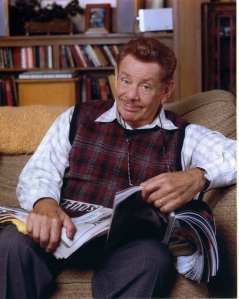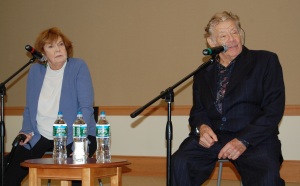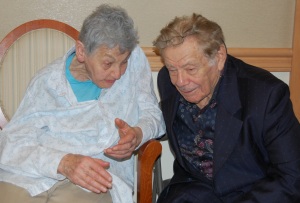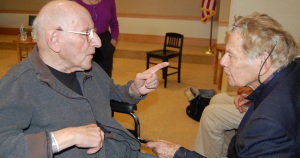A Few Questions for…Jerry Stiller
 The legendary comedy team and acting duo Jerry Stiller & Anne Meara will receive our Medal of Honor — The Fund’s highest award — during this year’s annual gala on May 21 [don’t forget to enter our Gala Raffle 2012 — you could win two tickets to Monday’s event, valued at $2,000!]. In anticipation of the big day, we threw a few questions their way, and they happily took some time out of their ever-busy schedules to respond! (We posted Anne’s fabulous answers a few weeks ago, and you can check them out here).
The legendary comedy team and acting duo Jerry Stiller & Anne Meara will receive our Medal of Honor — The Fund’s highest award — during this year’s annual gala on May 21 [don’t forget to enter our Gala Raffle 2012 — you could win two tickets to Monday’s event, valued at $2,000!]. In anticipation of the big day, we threw a few questions their way, and they happily took some time out of their ever-busy schedules to respond! (We posted Anne’s fabulous answers a few weeks ago, and you can check them out here).
Actors Fund: Can you tell us how got your start in the business?
Jerry Stiller: I remember my first connection with theater was down at the Henry Street Playhouse on the Lower East Side. I was 15 years old and what was going on at that time was the Depression and there was this thing called the Federal Theatre. They sent people down to the Settlement House and this particular playhouse. Her name was Esther Lane, this lady, and they were there to do shows for the people in the neighborhood. The Playhouse was still there and I went down one day and I was passing by and I heard music coming out of the theatre. It was someone at the piano playing Night and Day… I just kind of wandered into this little playhouse and on stage was somebody at the piano. The place was completely dark except for a blue circle of light at the back. And when he finished with the song something hit me. I walked up to him and said, “How do I become an actor?” He said, “Go upstairs and see Mrs. Lane.” I literally went upstairs and there was this wonderful woman who stayed with me in my life forever. She looked at me and said, “What’s your name?” I told her and she said, “Why are you here?” And I said, “I’d like to be an actor.” She said, “I have just the part for you. Tomorrow night you can play the emperor in Many Moons, a James Thurber play.” And I said, “Really?” “Yeah.” So I came back the next night and they gave me a costume like an emperor. She said all you have to do is come on stage, wait till they give you the signal and you pull the bell cord. That night I came on stage. At the signal I pulled the bell cord, and it fell on the floor! I learned so much from Mrs. Lane doing many shows there…. So my beginnings were at the Henry Street Playhouse.
AF: You both have done so many amazing things in your career, from writing to acting, but we have to admit that we adore your Stiller & Meara act. Is there a favorite moment from your sketches on shows like Ed Sullivan?
JS: The first one we did was the one that set us up with Ed Sullivan and he booked us after that. It was an interview between Pauline Fredricks [Anne] and a man [Jerry] who was living in Miami Beach with his daughter. One day she calls him up to have lunch and finds out that his name is Mr. Jonah and he claims he was swallowed by a whale. That was the first sketch we did… I look at it now, and it was the funniest thing. It was so completely loose and honest. There were no jokes in it, there was no anything and I knew it was great because about three months later, Bill Cosby was doing Noah.
AF: Comedy and socio/political awareness go hand-in-hand. Why do you think comedians and comedy writers are so important to society?
JS: It’s the truth. Comedians have this platform, this stage that was given to us by Aeschylus and then the Greeks created this, where someone can come out on the stage with a mask and put it over his face and say things that, once he had the mask on, would alert the audience, or electrify them or educate them and give them insights. (That’s what I learned in college). It seems to me that it developed into what they call the commedia dell’arte school where these kind of ragamuffin comedians play different characters (one was a doctor, one was a lawyer, one was a mistress). And that was the beginning of what later became improv… They were doing that way back when. But improv really got going in the 60s when Anne and I replaced Mike [Nichols] and Elaine [May] and also Shelley Berman [at The Compass Players, a predecessor to Chicago’s Second City], because they went on to do their acts on their own. And suddenly this word “improv” became what everyone was doing.
AF: You made a splash on the Internet last year with your web series, which brought Stiller & Meara back for a whole new generation. Are there any more Stiller & Meara projects we can look forward to?
JS: That was all good stuff. That was created by Ben [Stiller]. He was the one that got sponsorship for it. Right now we’re involved with something that’s called Million TreesNYC. It’s about planting trees in New York City… We’re chairpeople – Anne and myself. And Mayor Bloomberg put this idea together along with [parks department spokeswoman] Vickie Karp… We did some public service commercials about planting trees in New York City — planting trees on streets that you’d never think had [them]. So we’re spokespeople for that… It’s been a lot of fun.
AF: Our residents loved spending time with you at your recent visit to our Lillian Booth Actors Home in Englewood, NJ. What were your impressions of The Home?
JS: I’ve been there before and what I have to say, on a personal note, is it’s so amazing to me that there is such a place for actors and for people… who are connected with theater in some way. There’s people from every branch of theater there!
AF: Our readers know your work in the theatre, in films like The Taking of Pelham One Two Three, and on TV shows like Seinfeld and The King of Queens, but may not be aware of your commitment to assisting members of our profession in times of need. In fact, your advocacy in Albany was instrumental in the passage of the 2004 New York State Entertainment Industry COBRA subsidy, which has permitted thousands of people in performing arts and entertainment to keep their health insurance during periods of episodic employment. Why was this such an important issue for you personally?
JS: Because when actors finish a show—they are always finishing shows and they’re always looking for work—and up until this point before the COBRA Subsidy Bill was passed—when they lost their health insurance most of them couldn’t afford to self-pay. So we were able to pull that thing off by getting the political folk—the New York State Legislature and Sheldon Silver, and Joseph Bruno too –to recognize what a tremendous economic engine theatre and entertainment is in New York. It was very important. We were able to influence these people by going up to Albany. I was up there a number of times with Mrs. [Kitty Carlisle] Hart and Ginny Louloudes [Executive Director for A.R.T./NY]… And somewhere along the line, we were able to make things happen.
I’m so proud of this—I’ve got to tell you. That’s the best thing that ever happened to me as an actor. I don’t care about long runs or short runs or anything…. You get up in front of these legislators… and that was a great source of satisfaction when suddenly one day I started screaming like Fred Constanza at them. And they started laughing and they put away some money for us. So that to me is better than any part on Seinfeld or any of the other shows. This is the thrill.
When you asked what it’s like to get this honor, I can say god! When I started running around wanting to be an activist… I never thought in a million years that I would be doing something like this and be honored with my wife, Anne, and Harry [Belafonte] and David Steiner. All people who really feel the same way about how important theater is, and taking care of actors once they’ve had their day. So I’m good. I’m kvelling.



You must be logged in to post a comment.